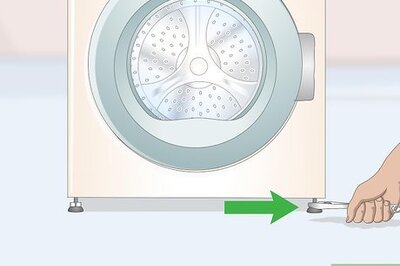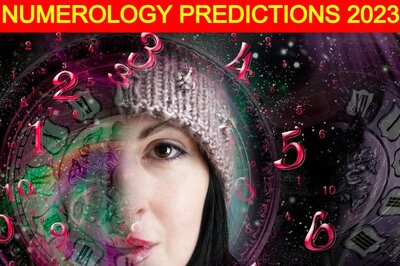
views
π
{\displaystyle \pi }
,
e
{\displaystyle e}
(Euler's number) or
ϕ
{\displaystyle \phi }
(the golden ratio).
2
{\displaystyle {\sqrt {2}}}
is an irrational number, and this can be proven algebraically in a very elegant manner.
Assume that 2 {\displaystyle {\sqrt {2}}} {\sqrt {2}} is rational. Then it can be expressed as a fraction a b {\displaystyle {\frac {a}{b}}} {\frac {a}{b}}, where a {\displaystyle a} a and b {\displaystyle b} b are both whole numbers, and b {\displaystyle b} b is not 0 {\displaystyle 0} {\displaystyle 0}. Furthermore, this fraction is written in simplest terms, meaning that either a {\displaystyle a} a or b {\displaystyle b} b, or both are odd whole numbers. 2 = a b {\displaystyle {\sqrt {2}}={\frac {a}{b}}} {\sqrt {2}}={\frac {a}{b}}
Square both sides. 2 = a 2 b 2 {\displaystyle 2={\frac {a^{2}}{b^{2}}}} 2={\frac {a^{2}}{b^{2}}}
Multiply both sides by b 2 {\displaystyle b^{2}} b^{2}. 2 b 2 = a 2 {\displaystyle 2b^{2}=a^{2}} 2b^{2}=a^{2}
Note that a 2 {\displaystyle a^{2}} a^{2} is an even number. a 2 {\displaystyle a^{2}} a^{2} is even number because it is equal to two times a whole number. Since a 2 {\displaystyle a^{2}} a^{2} is even, a {\displaystyle a} a must be even too, because if it were odd, a 2 {\displaystyle a^{2}} a^{2} would be odd as well (an odd number times and odd number is always an odd number). a {\displaystyle a} a is even, so that means it can be written as two times a certain whole number, or in other words, a = 2 k {\displaystyle a=2k} a=2k, where k {\displaystyle k} k is this whole number.
Substitute a = 2 k {\displaystyle a=2k} a=2k into the original equation. 2 = ( 2 k ) 2 b 2 {\displaystyle 2={\frac {(2k)^{2}}{b^{2}}}} 2={\frac {(2k)^{2}}{b^{2}}}.
Expand ( 2 k ) 2 {\displaystyle (2k)^{2}} (2k)^{2}. ( 2 k ) 2 = 2 2 k 2 = 4 k 2 {\displaystyle (2k)^{2}=2^{2}k^{2}=4k^{2}} (2k)^{2}=2^{2}k^{2}=4k^{2}. 2 = 4 k 2 b 2 {\displaystyle 2={\frac {4k^{2}}{b^{2}}}} 2={\frac {4k^{2}}{b^{2}}}
Multiply both sides by b 2 {\displaystyle b^{2}} b^{2}. 2 b 2 = 4 k 2 {\displaystyle 2b^{2}=4k^{2}} 2b^{2}=4k^{2}.
Divide both sides by two. b 2 = 2 k 2 {\displaystyle b^{2}=2k^{2}} b^{2}=2k^{2}
Note that b 2 {\displaystyle b^{2}} b^{2} is an even number. b 2 {\displaystyle b^{2}} b^{2} is even number because it is equal to two times a whole number. Since b 2 {\displaystyle b^{2}} b^{2} is even, b {\displaystyle b} b must be even too, because if it were odd, b 2 {\displaystyle b^{2}} b^{2} would be odd as well (an odd number times and odd number is always an odd number).
Recognise that this is a contradiction. You have just proven that b {\displaystyle b} b is even. However, you have also proven that a {\displaystyle a} a is an even number. This is a contradiction because in the beginning of this proof, it was assumed that a b {\displaystyle {\frac {a}{b}}} {\frac {a}{b}} was written in simplest terms, but if both a {\displaystyle a} a and b {\displaystyle b} b are even, the numerator en denominator can be divided by 2, which means it was not written in simplest terms. Since this is a contradiction, the original assumption that 2 {\displaystyle {\sqrt {2}}} {\sqrt {2}} is rational is false, thus leading to the conclusion that 2 {\displaystyle {\sqrt {2}}} {\sqrt {2}} is irrational.


















Comments
0 comment